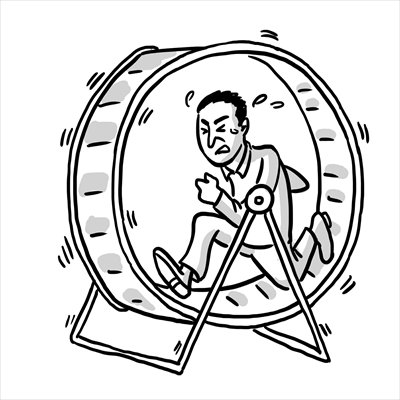Nation will escape fast-food literature given enough time

Illustration: Liu Rui/GT
This is not the first time that China has been criticized for leaving the golden age of reading behind. In July, an article by Sharmistha Mohapatra, an Indian expat living in Shanghai, describing the clusters of Chinese passengers she witnessed playing iPad games on a flight from Shanghai to Frankfurt, after which she concluded that the Chinese habit of reading was in decline. This stirred up lots of discussion.
Last week, an Atlantic article titled "Why aren't Chinese people reading books anymore?" said that "the country's once-robust trade in serious literature has withered under an increasingly materialistic, results-oriented society," and that while China boasts of having the largest publishing industry by number of works published, public enthusiasm has vanished.
An April survey by the Chinese Academy of Social Sciences, which is also quoted in this Atlantic article, reveals that in 2012, on average a Chinese person reads 4.39 books, spends 15 minutes reading each day, and is willing to spend only $2 on a 200-page book. All these numbers pale before counterparts in the US, France, Japan and South Korea.
But does all these really mean that in China the golden age of reading is forever gone? I'm not that pessimistic.
A couple of years ago, several Chinese serious literature magazines, which were very popular since the 1980s but nowadays only have very small groups of subscribers, decided to raise their prices after a painful struggle for survival.
I had a talk with the head of a top publishing house at that time. He also felt sad about the withering market for serious literature. According to him, one of the reasons is that readers in developed societies have higher living standards and so more demand for books.
His words made me think. For many of my friends who have decent jobs and time to spare, the pleasure of reading is irreplaceable. They read books, discuss books, and share books. It is as natural as exchanging gossip. Some are bestsellers in China, while others are original English novels or non-fictions that haven't been translated. Many bring back books when they travel abroad.
On social networks like douban.com, there are active netizens commenting, discussing and recommending books every day. All kinds of books are discussed, ranging from epics of ancient Rome and detective novels from Japan, to memoirs about modern Chinese history. Paid electronic reading services are available for various mobile terminals.
This is exactly like the quarrel over Chinese tourists. While there are lots of finger-pointing toward "uncivilized" Chinese tourists, it is also an undeniable fact that a new generation of Chinese tourists is growing. They respect local rules, they are open-minded about different customs, they are quiet in public occasions, and they prefer embracing local life rather than having whistle-stop tours in a fixed delegation.
While some stick to the traditional Chinese ways of behaving, like speaking loudly or slurping food, many others have bridged the culture gap. With more exchanges with foreigners and with greater opportunities of going global, the Chinese are integrating into the world in a more natural way.
Reading is in a similar situation. In the rat race, there are anxious Chinese everywhere struggling not only with peer pressure, but practical burdens of survival. Even a day off is a luxury, not to mention time to find a quiet place and read a book.
This also partly explains why "fast-food literature" is having its day in China. A book as long as 500 pages can be finished within just one afternoon, and one almost remembers nothing after skimming through the cliché ridden plot. It is just a way to relax after a tedious, busy day, not an examination of the human condition.
In time, the Chinese will climb Maslow's hierarchy of needs toward reading and other higher pleasures. The thirst for reading is natural, after basic needs are satisfied. And the Chinese are no exception.
The author is an opinion editor with the Global Times. chenchenchen@globaltimes.com.cn